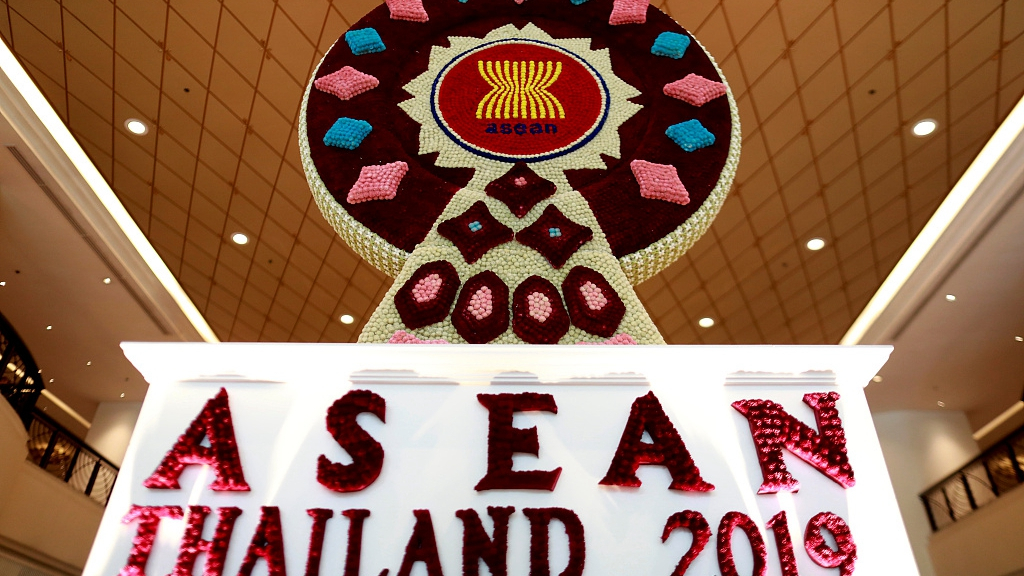
The ASEAN logo, made out of flowers, is seen during the 34th ASEAN Summit in Bangkok, Thailand, June 19, 2019. (Photo: VCG)
Thailand is chairing the 2019 summit of the Association of Southeast Asian Nations (ASEAN) on June 20-23 in Bangkok under the theme of "Advancing Partnership for Sustainability," ten years after it last held the chairmanship of ASEAN.
The 14th ASEAN summit in Thailand didn't go on smoothly as it was postponed for a month after anti-government protesters stormed into the venue leading the country to a state of emergency. Now, ten years have passed, and Thailand has once again taken over the chairmanship. What is Thailand's proposal for the future development of ASEAN and how will this year's summit be different from the one in 2009?
Clues can be seen through the theme of this year.
Advancing partnership for sustainability
As Prime Minister Prayut Chan-o-cha said in his acceptance speech of the ASEAN chairmanship in November 2018, ASEAN is facing multiple regional and global challenges with increasing changes and uncertainties. Under the circumstances, promoting a sound economic and sustainable development, as well as enhancing ASEAN's role in regional affairs, stand as two major goals for ASEAN under Thailand's chairmanship.
The theme of this year's summit, to some degree, reveals Thailand's ambition. According to Prayut, "advance" means to make use of technologies to tackle disruptive technologies and future challenges, while "partnership" includes economic cooperation with all countries in regional affairs and on the international stage.
Thailand highlights economic and sustainable development in the prime minister's speech and hopes to achieve the goal by promoting connectivity, "strengthening ASEAN's various partnerships" to increase economic cooperation with all countries and "building sustainability in all dimensions include the green economy and sustainable development."
Regarding participation in regional affairs, Thailand called for greater unity and centrality of ASEAN and the reinforcing of the ASEAN-centered regional architecture as well as ASEAN's role so as to "remain a driving force for key developments in the region," according to a press statement released in January this year.
These all indicate Thailand's aspiration of playing a leading role in regional affairs under the chairmanship of ASEAN.
A new government but not a new comer
Thailand held its first general election since the 2014 coup in March, and formed a new parliament two months later. Last Tuesday, Thai King Maha Vajiralongkorn formally appointed General Prayut, the former army chief, as Thailand's 29th prime minister, officially ending the power vacuum in Thailand.
Given the political transition in Thailand, the upcoming 34th ASEAN summit is believed to be a challenging task since it will be the first event of multilateral diplomacy attended and hosted by the newly-elected government while time for preparation is little.
Before, to ensure the stability to Thai politics and avoid a power vacuum during the ASEAN summit meeting, the Thai government broke the norms by holding the first summit in late June, one month later than the usual date of late April and early May.
The move caused concerns over the Kingdom's ability to carry out the important tasks since there will be nearly 200 rounds of regional conferences held this year, especially after the turmoil jeopardized the summit 10 years ago, ASEAN leaders hope Thailand can steer the progress this time when the regional grouping are faced with regional as well as global challenges which requires greater connectivity and integration, according to former Thai diplomat Kobsak Chutikul.
Although it may be the first time for Prayut's government to host the summit, Thailand, as one of the founding members and key supporters, is no stranger to ASEAN. The ASEAN Declaration that founded ASEAN, also known as the Bangkok Declaration, is signed in Thailand.
Economically, Thailand ranked second in terms of GDP among ASEAN countries, accounting for 16.5 percent of the total amount, according to data from the World Bank. Prayut also positioned Thailand as "a regional architect of ASEAN" in his acceptance speech of the ASEAN chairmanship, pledging to continue "the good work" on the prioritized tasks of the ASEAN and ensure "the continuity and sustainability for the ASEAN Community." These all indicate that Bangkok has been among the biggest supporters of the regional organization.
Despite little time left for the new government, experts believe that Thailand still has perhaps the most suitable profile to host the summit and a total of nearly 200 related activities. Ten years later, not only the ASEAN countries but also the whole world is watching the upcoming 34th ASEAN summit. Considering the political unrest during the 14th summit, Thailand needs to take this opportunity to reshape its image and show the whole world its capacity to lead the regional grouping.


